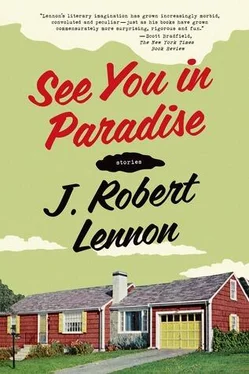Abu Ghraib made her vomit, and when Kerry lost, she burned her own hand on the stove top on purpose.
For his part, Carl didn’t like the president either. Indeed, he disliked the man very much, the whole lot of liars and fascists. But he didn’t complain, because he had no intention of doing anything about it. He didn’t go to protests or marches, didn’t blog his opinions, didn’t stage voter-registration drives or man phone banks. His sole rebellion was his vote, which he cast every four years. He didn’t think this entitled him to much acting-out. And so he kept his opinions to himself.
But at some point during the era of Hurricane Katrina, Valerie Plame, Jack Abramoff, and warrantless wiretapping, Lurene’s misery reached a disturbing new nadir, a state of steady and imperturbable deadness. News of the latest atrocities struck her with the force of stones flung into the sea; they made their mark with a pale splash, and then vanished underneath the monotonous pummeling waves. At breakfast, she and Carl carried on conversations like this:
“If you get out of that meeting before six, let’s go to Jason’s for dinner.”
“—”
“More coffee?”
“Mm.”
“You look pretty this morning.”
“—”
The fact was, she didn’t look pretty this morning. She looked ghoulish. Her hair had gone lank, her face ashen, her eyes sunken into purple calderas of damp flesh. Her lips were bitten raw and her clothes hung crookedly on her body. Several times each day, Carl found her frozen in some prosaic tableau, her mouth hanging open and her lips twitching, one hand flopped like a hunk of rotten fish on the kitchen counter or off the edge of the bed. And then, as if prodded with electrodes, she would jerk, cough, and start up again, ploughing into whatever was left of her day.
One night, Carl tried to talk to her about it.
“You seem different lately,” he said gently, his hand resting ajitter on her bony knee.
She shrugged, turned the page of her magazine.
“I’m afraid you’re falling into …”
“Don’t say it, Carl.”
“… that you’re suffering from …”
“Don’t.”
He stopped, pulled his hand away, settled back into his little nest of throw pillows. Depression, he didn’t say. The word, with all its clinical associations, was forbidden in their house. It cast unhappiness as a problem, one that could, and should, be solved. Depression was a frailty. Unhappiness, on the other hand, was a way of life. Lurene insisted upon the distinction and had lodged herself permanently and immovably in the unhappiness camp. End of discussion.
But not end of problem, because she got worse. She walked around crying. She began taking sick days off work. She smoldered with resentment for Carl and his asshole, cocksucking bonsai trees and 1920s jazz and arugula, and she took to spitting in his path, as if to curse him, or at least make him slip and break something.
And then, on an unseasonably warm morning in the middle of February — three days, in fact, before Valentine’s Day, a holiday they habitually, pointedly did not celebrate — Lurene broke through the floor of her misery and into some annihilating subbasement of agony. He heard her fall: she was standing at the kitchen counter in her business skirt and white blouse, pouring milk into her coffee, and her knees buckled, her hands found the countertop, and a sound escaped her, a mortal, creaking gong, like a pair of rusted cemetery gates at long last falling open. And once they did, the furies poured through, and Lurene keened like a dying animal, and tore open her blouse, scraping red lines down her neck and chest.
Carl had been trying to read an article in the paper about third-world debt relief around the ragged Bush-hole he had torn in the other side. He threw the paper down and leaped to his feet. He ran across the room and caught his wife as she fell.
“Let go of me,” she wailed, but made no move to push him away. She collapsed into his body, knocking him off balance, and the table barked against the linoleum floor as it jumped away from his palm.
“My God,” he said. “Lurene.”
She resisted, righted herself, pressed her hands to his chest.
“Let me go.”
“I won’t.”
“You will, you fuck.”
“I won’t.”
But he did. He caught his balance, she caught her breath, and he allowed her to extricate herself from his embrace. For a moment they stood facing each other, panting, unsteady on their feet.
“Maybe you should lie down.”
“I’m going to do it, Carl. I am.”
“No, you won’t.”
“I’m going to kill myself,” she said. Her face tilted up to his, trembling as if it might shatter, cutting him to shreds with its pieces. This was new. This, he had never before seen.
“You won’t. You will not.”
Her only reply was a sigh.
“You’re exhausted. You need to rest.”
Her head shook no, no.
“Lie down. I will be right there. Lie down.”
She sighed again and turned toward the bedroom.
“That’s it. I’ll call in to work for you.”
She dragged herself away and disappeared down the hall.
As soon as she was out of sight, he took two swift, heavy steps to the phone where it hung on the wall. He picked it up and pressed 9, and a moment later pressed 1. He heard, from the bedroom, the sound of the bedsprings compressing, and drew breath. He gazed at his newspaper where it lay, the plate of cantaloupe humped below it, and at the dark gray stain limned by its wetness. His finger hovered over the 1.
Then his eyes traveled to the counter where Lurene had fallen and saw the cutting board, covered with the rough husks of his breakfast. It was wrong somehow, and he stared at it. In the bedroom, Lurene emitted a high, pneumatic whine. A chill ran through him.
The paring knife was missing.
He gasped, dropped the receiver. It bounced against the wall, thudding hollowly as an old bone. He spun and lunged into the hallway.
She was there.
For a moment he thought it was someone else. She was standing straight, her shoulders thrown back, her head held high. She was buttoning her blouse back over her unblemished chest and neck. Her eyes were bright, and something was the matter with her face.
She was smiling.
“Lurene?”
“God,” she said, with a little laugh, “sorry about that!”
He stared. She shook her head and advanced toward him with a kiss. It made a soft hot smack against his cold lips.
“I have no idea what came over me,” she said. There were tears on her face, and she cheerfully wiped them off with a quick finger, as if they’d blown onto her from somewhere outside. “But I feel much better.”
She moved past him to the coatrack and shouldered on her heavy jacket.
“I thought …” he stammered.
“Me too!” She gawked at him for a long moment, then let out a mighty equine guffaw. “For a minute there, I wanted to die.”
“So you said.”
“I’m really sorry.” She pulled her woolen cap out of her pocket and popped it onto her head. Her hair pressed against her cheeks and five years dropped off her in an instant. “I scared you. I’m sorry.”
“It’s all right.” He slumped back into his seat.
“It was just, you know, everything, it just came down on me all of a sudden.” She had her purse now, her keys, her hand on the doorknob.
“I thought you took the knife.”
She blushed. Blushed! Lurene had never once blushed, as far as Carl could remember. She said, “I did,” and immediately clapped a prim hand over her mouth. Her fingers parted, her lips poked through, and she said it again. “I don’t know what I thought I was going to do. But something snapped, and I felt better.” She shrugged. “Gotta go. I’m sorry, sweetie.”
Читать дальше












